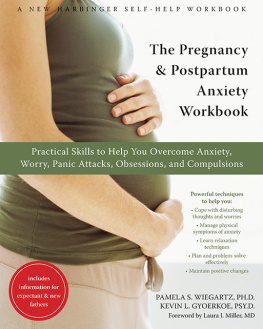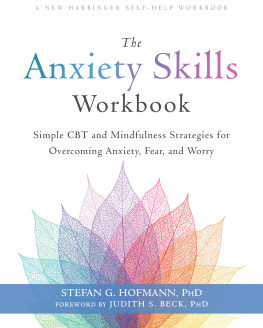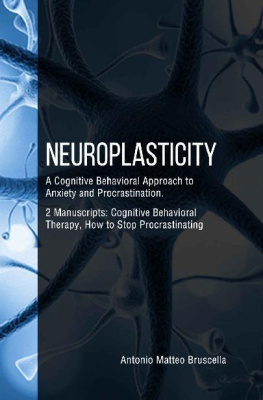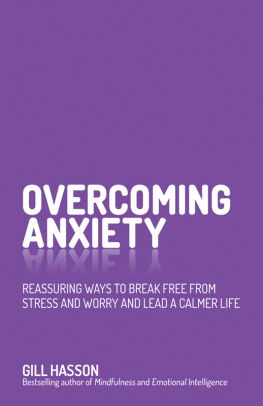References
Bandura, A. 1997. Self-Efficacy: The Exercise of Control. New York: Freeman.
Beck, A.T., A.J. Rush, B.F. Shaw, and G. Emery. 1979. Cognitive Therapy of Depression. New York: Guilford Press.
Bower, S.A. and G.H. Bower. 1991. Asserting Yourself: A Practical Guide for Positive Change. 2 nd ed. New York: Perseus Books.
Brantley, J. 2007. Calming Your Anxious Mind: How Mindfulness and Compassion Can Free You from Anxiety, Fear, and Panic. Oakland, CA: New Harbinger Publications.
Brownlow, S. and R.D. Reasinger. 2000. Putting off until tomorrow what is better done today: Academic procrastination as a function of motivation toward college work. Journal of Social Behavior and Personality 15:15-34.
Burka, J.B. and L.M. Yuen. 2008. Procrastination: Why You Do It, What to Do About It Now. Cambridge, MA: Da Capo Press.
Chu, A.H.C. and J.N. Choi. 2005. Rethinking procrastination: Positive effects of active procrastination behavior on attitudes and performance. Journal of Social Psychology 14:245-264.
Cobb, S. 1976. Social support as a moderator of life stress. Psychosomatic Medicine 38:300-314.
Craigie, M.A., C.S. Rees, A. Marsh, and P. Nathan. 2008. Mindfulness-based cognitive therapy for generalized anxiety disorder: A preliminary evaluation. Behavioural and Cognitive Psychotherapy 36: 553-568.
Dietz, F., M. Hofer, and S. Fries. 2007. Individual values, learning routines, and academic procrastination. British Journal of Educational Psychology 77:893-906.
Effert, B.R. and J.R. Ferrari. 1989. Decisional procrastination: Examining personality correlates. Journal of Social Behavior and Personality 4:151-161.
Evans, S., S. Ferrando, M. Findler, C. Stowell, C. Smart, and D. Haglin. 2008. Mindfulness-based cognitive therapy for generalized anxiety disorder. Journal of Anxiety Disorders 22:716-721.
Foa, E.B. and M.J. Kozak. 1986. Emotional processing of fear: Exposure to corrective information. Psychological Bulletin 99:20-35.
Fritzsche, B.A., B.R. Young, and K.C. Hickson. 2003. Individual differences in academic procrastination tendency and writing success. Personality and Individual Differences 35:1549-1557.
Hayes, S. 2005. Get Out of Your Mind and Into Your Life. Oakland, CA: New Harbinger.
House, J.S. 1981. Work Stress and Social Support. Reading, MA: Addison-Wesley.
Kabat-Zinn, J. 1990. Full Catastrophe Living. New York: Delacorte Press.
. 1994. Wherever You Go, There You Are. New York: Hyperion.
Kim, Y.W., S.H. Lee, T.K. Choi, S.Y. Suh, B. Kim, C.M. Kim, S.J. Cho, M.J. Kim, K. Yook, M. Ryu, S.K. Song, and K.H. Yook. 2009. Effectiveness of mindfulness-based cognitive therapy as an adjuvant to pharmacotherapy in patients with panic disorder or generalized anxiety disorder. Depression and Anxiety 26:601-606.
Klibert, J.J., J. Langhinrichsen-Rohling, and M. Saito. 2005. Adaptive and maladaptive aspects of self-oriented versus socially prescribed perfectionism. Journal of College Student Development 46:141-156.
Ladouceur, R., M.J. Dugas, M.H. Freeston, E. Leger, F. Gagnon, and N. Thibodeau. 2000. Efficacy of a cognitive-behavioral treatment for generalized anxiety disorder: Evaluation in a controlled clinical trial. Journal of Consulting and Clinical Psychology 68(6):957-964.
Locke, E. 2002. Setting goals for life and happiness. In Handbook of Positive Psychology, eds. C.R. Snyder and S.L. Lopez, 299312. New York: Oxford University Press.
McCown, W., J. Johnson, and T. Petzel. 1989. Procrastination, a principal components analysis. Personality and Individual Differences 10:197-202.
Mehrabian, A. 2000. Beyond IQ: Broad-based measurement of individual success potential or emotional intelligence. Genetic, Social, and General Psychology Monographs 126:133-239.
Milgram, N. and Y. Toubiana. 1999. Academic anxiety, academic procrastination, and parental involvement in students and their parents. British Journal of Educational Psychology 69:345-361.
Miller, W. and S. Rollnick. 2002. Motivational Interviewing: Preparing People for Change, 2nd ed. New York: Guilford.
Onwuegbuzie, A.J. and K.M.T. Collins. 2001. Writing apprehension and academic procrastination among graduate students. Perceptual and Motor Skills 92:560-562.
Senecal, C., K. Lavoie, and R. Koestner. 1997. Trait and situational factors in procrastination: An interactional model. Journal of Social Behavior and Personality 12:89-903.
Sirois, F.M., M.L. Melia-Gordon, and T.A. Pychyl. 2003. Ill look after my health, later: An investigation of procrastination and health. Personality and Individual Differences 35:1167-1184.
Skinner, B.F. 1965. Science and Human Behavior. New York: Free Press.
Spada, M.M., K. Hiou, and A.V. Nikcevic. 2006. Metacognitions, emotions, and procrastination. Journal of Cognitive Psychotherapy 20:319-326.
Steel, P. 2007. The nature of procrastination: A meta-analytic and theoretical review of quintessential self-regulatory failure. Psychological Bulletin 133:65-94.
Stber, J. and J. Joorman. 2001. Worry, procrastination, and perfectionism: Differentiating amount of worry, pathological worry, anxiety, and depression. Cognitive Therapy and Research 25:49-60.
Stoeber, J., A.R. Feast, and J.A. Hayward. 2009. Self-oriented and social prescribed perfectionism: Differential relationships with intrinsic and extrinsic motivation and test anxiety. Personality and Individual Differences 47:423-428.
Sub, A. and C. Prabha. 2003. Academic performance in relation to perfectionism, test procrastination, and test anxiety of high school children. Psychological Studies 48:77-81.
Tan, C.X., R.P. Ang, R.M. Klassen, I.Y.F Wong, W.H. Chong, V.S. Huan, and L.S. Yeo. 2008. Correlates of academic procrastination and students grade goals. Current Psychology 27:135-144.
Van Eerde, W. 2003. Procrastination at work and time management training. Journal of Psychology 137(5):421-434.
Wegman, D. 1994. White Bears and Other Unwanted Thoughts: Suppression, Obsession, and the Psychology of Mental Control. New York: Guilford Press.
Zinbarg, R.E., M.G. Craske, and D.H. Barlow. 1993. Mastery of Your Anxiety and Worry: Therapist Guide. San Antonio, TX: Harcourt Brace.

Wiegartz and Gyoerkoe have written an invaluable guide for overcoming problems with procrastination in the context of worry and anxiety. The book teaches readers to understand why they put off tasks and provides them with effective, step-by-step strategies for dealing with procrastination and overcoming anxiety and perfectionism, which often contribute to procrastination. I highly recommend this book for anyone whose anxiety prevents them from getting things done. Dont put it offread this book now!
Martin M. Antony, Ph.D., ABPP, professor in the department of psychology at Ryerson University and author of When Perfect Isnt Good Enough and The Anti-Anxiety Workbook
Problems associated with chronic procrastination have been largely overlooked in self-help literature. Drawing upon the latest findings from clinical research, Pamela Wiegartz and Kevin Gyoerkoe provide practical tools to help people make timely decisions and stop putting important aspects of their life on hold.
C. Alec Pollard, Ph.D., director of the Anxiety Disorders Center at Saint Louis Behavioral Medicine Institute and professor of family and community medicine at Saint Louis University













